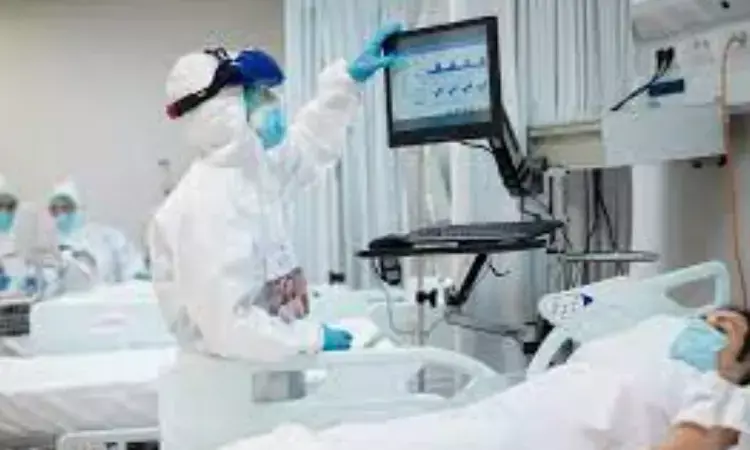- Home
- Medical news & Guidelines
- Anesthesiology
- Cardiology and CTVS
- Critical Care
- Dentistry
- Dermatology
- Diabetes and Endocrinology
- ENT
- Gastroenterology
- Medicine
- Nephrology
- Neurology
- Obstretics-Gynaecology
- Oncology
- Ophthalmology
- Orthopaedics
- Pediatrics-Neonatology
- Psychiatry
- Pulmonology
- Radiology
- Surgery
- Urology
- Laboratory Medicine
- Diet
- Nursing
- Paramedical
- Physiotherapy
- Health news
- Fact Check
- Bone Health Fact Check
- Brain Health Fact Check
- Cancer Related Fact Check
- Child Care Fact Check
- Dental and oral health fact check
- Diabetes and metabolic health fact check
- Diet and Nutrition Fact Check
- Eye and ENT Care Fact Check
- Fitness fact check
- Gut health fact check
- Heart health fact check
- Kidney health fact check
- Medical education fact check
- Men's health fact check
- Respiratory fact check
- Skin and hair care fact check
- Vaccine and Immunization fact check
- Women's health fact check
- AYUSH
- State News
- Andaman and Nicobar Islands
- Andhra Pradesh
- Arunachal Pradesh
- Assam
- Bihar
- Chandigarh
- Chattisgarh
- Dadra and Nagar Haveli
- Daman and Diu
- Delhi
- Goa
- Gujarat
- Haryana
- Himachal Pradesh
- Jammu & Kashmir
- Jharkhand
- Karnataka
- Kerala
- Ladakh
- Lakshadweep
- Madhya Pradesh
- Maharashtra
- Manipur
- Meghalaya
- Mizoram
- Nagaland
- Odisha
- Puducherry
- Punjab
- Rajasthan
- Sikkim
- Tamil Nadu
- Telangana
- Tripura
- Uttar Pradesh
- Uttrakhand
- West Bengal
- Medical Education
- Industry
IV Vasoactive Intestinal Peptide improves survival from Respiratory failure in COVID-19

A recent study that was published in Critical Care Medicine found that Aviptadil, a synthetic form of vasoactive intestinal peptide (VIP) can improve the likelihood of survival from respiratory failure at day 60 in critical COVID-19 patients. In any scenario of the absence of drug-related serious adverse events and an acceptable safety profile, the use of Aviptadil was found to be favorable for the management.
Respiratory failure in SARS-COVID-19 is caused by selective binding of the coronavirus to the alveolar type 2 cell of the pulmonary epithelium through angiotensin-converting enzyme 2 receptor. It is a lethal complication and is resistant to drug therapy. Previous nonclinical studies have shown that VIP upregulates surfactant production, inhibits cytokine synthesis, prevents cytopathy, and blocks replication of the severe acute respiratory syndrome coronavirus 2 viruses in pulmonary cells. It binds to the VIP receptor 1 of the AT2 cell and protects the lung from any adverse effects. Researchers have conducted a multicenter, placebo-controlled trial to determine whether Aviptadil can improve survival and recovery in patients with COVID-19 respiratory failure compared with placebo and demonstrate biological effects in such patients.
The study was carried out in six tertiary-care hospitals and four community hospitals on 196 patients with COVID-19 respiratory failure. Participants were randomized 2:1 to receive 3 days of IV Aviptadil or placebo. The primary end point of measurement was being alive and free from respiratory failure at day 60.
Key findings:
- Primary endpoint did not reach statistical significance for patients treated with Aviptadil when controlling for baseline ventilation status as prespecified in the protocol.
- A statistically significant two-fold odds of improved survival at 60 days were found.
- Significant improvement in respiratory distress ratio and reduced interleukin 6 cytokine release by day 3 could be noticed.
Take home message:
- Vasoactive intestinal peptide (VIP) has been shown in nonclinical studies to protect the lungs against a broad array of experimental caustic, immune, and infectious injuries by increasing surfactant production.
- This randomized, multicenter, placebo-controlled phase IIb/III clinical trial aimed to evaluate the use of VIP (IV Aviptadil) in critically ill patients with COVID-19 and acute hypoxic respiratory failure. After examining 196 patients, the authors found that the primary endpoint (being alive and free of respiratory failure at 60 days) did not reach statistical significance.
- Aviptadil treatment was associated with improved lung oxygenation and reduced cytokine storm during the first week of treatment and showed a clinically meaningful improvement in survival; however, a longer study period is necessary to confirm these results.
Reference:
Youssef JG, Lavin P, Schoenfeld DA, et al. The Use of IV Vasoactive Intestinal Peptide (Aviptadil) in Patients With Critical COVID-19 Respiratory Failure: Results of a 60-Day Randomized Controlled Trial [published online ahead of print, 2022 Aug 31]. Crit Care Med. 2022;10.1097/CCM.0000000000005660. doi:10.1097/CCM.0000000000005660
BDS, MDS
Dr.Niharika Harsha B (BDS,MDS) completed her BDS from Govt Dental College, Hyderabad and MDS from Dr.NTR University of health sciences(Now Kaloji Rao University). She has 4 years of private dental practice and worked for 2 years as Consultant Oral Radiologist at a Dental Imaging Centre in Hyderabad. She worked as Research Assistant and scientific writer in the development of Oral Anti cancer screening device with her seniors. She has a deep intriguing wish in writing highly engaging, captivating and informative medical content for a wider audience. She can be contacted at editorial@medicaldialogues.in.
Dr Kamal Kant Kohli-MBBS, DTCD- a chest specialist with more than 30 years of practice and a flair for writing clinical articles, Dr Kamal Kant Kohli joined Medical Dialogues as a Chief Editor of Medical News. Besides writing articles, as an editor, he proofreads and verifies all the medical content published on Medical Dialogues including those coming from journals, studies,medical conferences,guidelines etc. Email: drkohli@medicaldialogues.in. Contact no. 011-43720751




